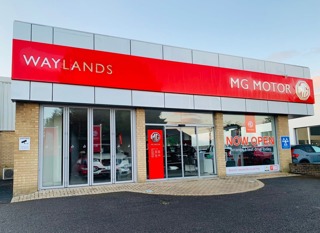2019 half-year pre-tax profits at Caffyns have plunged 92% from the same period in 2018 as it battled Volkswagen and Audi supply problems and “a difficult economic and political background”.
The franchised dealer group’s revenues for the period also fell to £100 million from £106m in H1 2018.
Caffyns reported half-year profits before tax of £56,000, down from £704,000. Operating profit fell from £1.36m to £836,000.
The dealer group left its interim dividend unchanged year-on-year at 7.5p.
Caffyns chief executive Simon Caffyn said: “Whilst disappointing, the results should be read against a difficult economic and political background. This was compounded by supply problems for new cars.
“These supply issues have however improved, and we remain cautiously optimistic about the future outlook."
The group’s statement to the London Stock Exchange said the company continues to own all but one of the freeholds of the properties from which it operates, “and this provides the dual strengths of a strong asset base and minimal exposure to rent reviews which is reassuring in these uncertain times”.
While Caffyns Volvo in Eastbourne “traded very profitably in the period”, and its Seat dealership “continued to perform strongly, said Caffyns, the financial performance of its Volkswagen division “worsened markedly” and was loss-making, as was its Audi division.
The Caffyns Vauxhall dealership in Ashford improved its trading performance, but the Caffyns Motorstore used car business also in Ashford “had a very disappointing six months and was loss-making for the period”.
The car dealer group said changes have been made to the management of the operation and to its stock profile and operational processes, and it is confident that the second six months of this financial year will see the business return to profitable trading.
"I am very grateful for the dedication and professionalism shown by our employees.
"The marketplace in which we have operated has been very challenging, particularly for new car sales following the implementation of the second phase of the emissions testing regime, and their hard work and professional application is much appreciated by the board," said Caffyn.
Its new car deliveries in the period fell by 14.5%, more than double the 6.1% reduction recorded in the retail and small business market segment in which Caffyns said it primarily operates,, although the Vauxhall, Volvo, Skoda and Seat operations "were broadly in line with the market".
Used cars sales volumes from the franchised sites rose 2.6% in the period but a weak performance from the Motorstore operation left overall used car unit sales down by 2.3% on the previous year.
But Caffyn highlighted that over a five-year period, the dealer group has recorded 36% growth in the number of used cars sold by its current businesses, "and we continue to see this area as providing opportunities for further growth".
Aftersales revenues were up 2% on a like-for-like basis.
Caffyns has banking facilities with HSBC Bank which comprise a term loan, originally of £7.5 million, and a revolving-credit facility of £7.5 million, both of which will become renewable in March 2023.
HSBC Bank also provides an overdraft facility of £3.5 million, renewable annually. In addition, there is an overdraft facility of £7.0 million provided by Volkswagen Bank, renewable annually, together with a term loan, originally of £5.0 million, which is repayable over the ten years to November 2023.
Bank borrowings, net of cash balances, at September 30 2019 had risen year-on-year to £13m (2018: £12.2m), but was down from £13.6m at March 31 2019.
Bank borrowings increased as a proportion of shareholders' funds increased to 49% (2018: 42%). Caffyns said the increase in gearing over the previous twelve months was primarily the result of the widening in the net deficit of the company's defined-benefit pension scheme.
Caffyns ended its 2018/19 financial year with a 3.1% drop in revenues and pre-tax losses of £428,000, caused by several non-underlying items such as a £900,000 charge to the accounts for equalising its guaranteed minimum pensions for males and females in its now closed defined-benefit pension scheme.
Operating profit fell to £0.9m last year from £2.3m in 2017/18.






















Login to comment
Comments
No comments have been made yet.